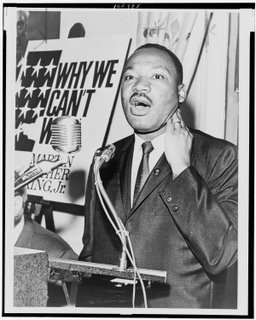 Martin Luther King has become an all-purpose feel-good symbol for many, if not most, Americans. The problem is for a portion of those people their stated admiration is either insincere or in ignorance.
Martin Luther King has become an all-purpose feel-good symbol for many, if not most, Americans. The problem is for a portion of those people their stated admiration is either insincere or in ignorance. I am old enough to remember that Martin Luther King was not revered in life as he is in death. He was a controversial figure while he lived and hated by many. Following his assassination I remember more than one-person say he got what he deserved.
True, King’s drive for and belief in racial equality, while radical at the time, has become a national norm -- whether or not that goal has been met -- but it is also part of the King legacy that he opposed the war in Vietnam as a pacifist and favored some sort of system of income distribution as part of the Poor People’s Campaign he was promoting at the time he was murdered. Somehow, I don’t think these issues are what President Bush had in mind during his remarks at the dedication of the King memorial a few days ago. Those positions were radical then and they are radical now. King, in life, was far more interesting, far more challenging, and far more vibrant than this rather uncontroversial and flat symbol he has become in death.
Here are some thoughts from Sanford Levinson at the Open University blog:
You can read Levison’s entire blog entry here.… We tend to forget that King was a pacifist and that he had paid an immense political cost with the Johnson administration because of his ever-increasing opposition to the Vietnam war (a stance not shared, incidentally, by other Black leaders of the time, including Roy Wilkins and Bayard Rustin, who were more willing to cut Johnson a lot of slack on the war). One can only imagine what King would have thought of the Iraq venture and the defense by the U.S. of its methods of interrogation.
… King was more than aware that passing anti-discrimination laws meant relatively little to those really at the bottom of the class structure. It is impossible to imagine that King would have had anything other than deserved contempt for the modern Republican Party epitomized by Bush, with its embrace of increasing inequality and endless breaks for the rich….
Martin Luther King now serves as an all-purpose symbol and therefore, for most Americans, a symbol of almost nothing at all concrete. In his time, and especially at the end of his life, he was engaging in a prophetic form of social criticism that we have chosen to forget while enjoying the spectacle of Bill Clinton and George W. Bush in warm embrace.
No comments:
Post a Comment